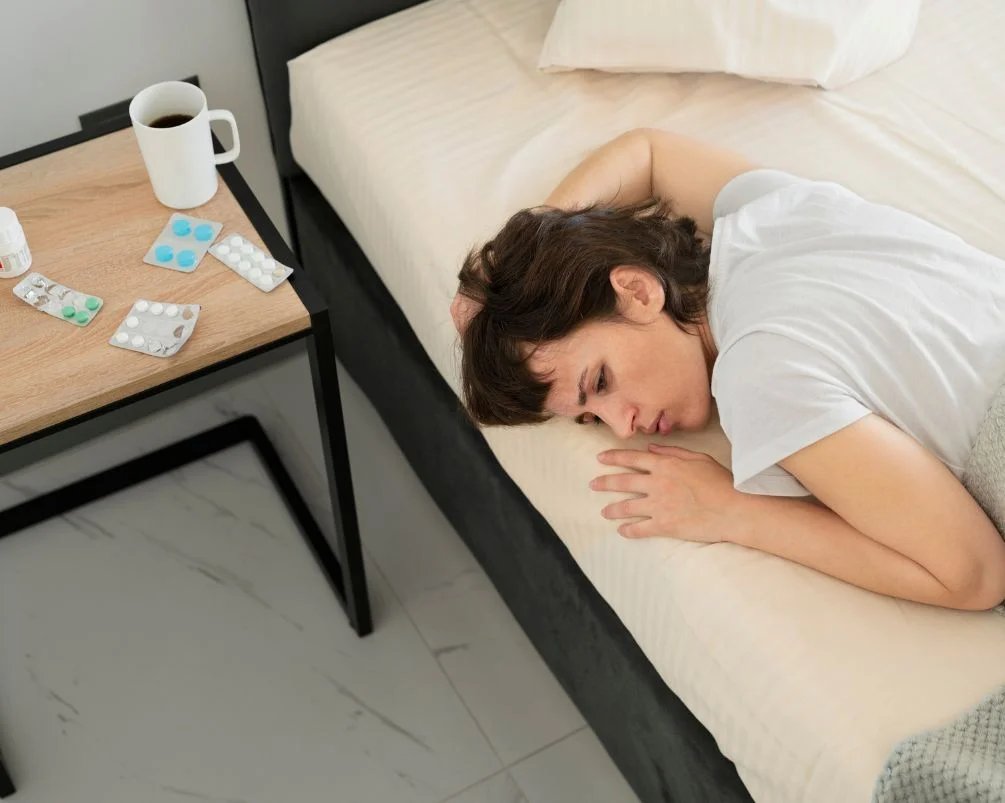What are you looking for?
Search
Welcome to Apotheek Plus France!

How Clonazepam Works: Understanding Its Effects on Sleep and Anxiety

Clonazepam is part of the benzodiazepine family of drugs, a category known for its sedative or calming effects. Doctors prescribe it for anxiety disorders, panic attacks, and seizures. Others use it off-label for insomnia. Millions of people depend on this medication, but few know how it works.
This blog details how Clonazepam works on the brain, how it alters sleep and anxiety, risks, and safer alternatives. The knowledge of this information can aid patients in the wise utilization of medication and make informed health decisions.
What is Clonazepam?
Clonazepam 2mg is a prescription anxiety medication that promotes relaxation and dampens excessive brain activity. It is approved by the F.D.A. to treat anxiety, panic disorders, and seizures. Some doctors also prescribe it off-label for insomnia and restless leg syndrome.
Because it acts quickly and lasts a long time, many people prefer it for short-term relief from anxiety and control of seizures. But like other benzodiazepines, there’s the potential for dependence. Patients need to tread carefully with it and have a doctor monitoring what they are doing.
What Is Clonazepam Used For?
Clonazépam is mainly indicated in France for:
-
Epilepsy (generalized and focal seizures)
-
Myoclonic seizures
-
Absence seizures (in children)
-
Movement disorders such as tics or restless legs syndrome (in rare cases)
While in other countries, doctors may prescribe it for:
-
Generalized Anxiety Disorder (GAD)
-
Panic attacks
-
Sleep disorders related to anxiety or stress
However, in France, these uses are considered off-label and require justification from a neurologist or psychiatrist, plus regular monitoring.
Dosage and Administration (Posologie)
Clonazepam is available in 0.5 mg, 1 mg, and 2 mg tablets, and as Rivotril® oral drops. The dosage must be individualized depending on age, weight, and clinical condition.
|
Indication |
Starting Dose |
Maintenance Dose |
Maximum Dose |
|
Adults (epilepsy) |
0.5–1 mg daily |
2–8 mg/day (divided) |
20 mg |
|
Elderly |
0.25 mg daily |
Adjust slowly |
2–4 mg/day |
|
Children |
0.01–0.03 mg/kg/day |
0.1–0.2 mg/kg/day |
– |
|
Off-label anxiety (not France-approved) |
0.25 mg twice daily |
Up to 2 mg/day |
4 mg |
Never adjust the dose on your own. Dose changes must be gradual to avoid withdrawal symptoms or seizures.
The medication can be taken with or without food, usually in the evening, as it can cause drowsiness and sedation.
How Clonazepam 2mg Works in the Brain
Clonazepam amplifies the effects of gamma-aminobutyric acid (GABA), the brain’s primary inhibitory neurotransmitter. GABA inhibits nerve activity, inducing calm and relaxed feelings.
Consider GABA the brain’s turn-down-the-volume button. It turns down activity when it gets too loud.” This also helps to prevent overstimulation, thereby relieves anxiety, muscle tension, and seizures.
Because the drug slows brain activity, it also causes drowsiness. This makes it beneficial for sleep-related disorders but can lead to over-sedation for some people.
Effects on Sleep
Clonazepam affects sleep architecture, increasing total sleep and decreasing waking at night. It helps many people with anxiety fall asleep or stay asleep, and they need to sleep.”
On the other hand, Clonazepam can inhibit rapid eye movement (REM) sleep. REM sleep also plays a key role in cognitive processes and emotion regulation. Over time, this can diminish our ability to achieve restorative sleep, which can cause users to awaken fatigued even after spending the recommended hours asleep.
Effects on Anxiety
Anxiety disorders frequently result in an overactive brain, contributing to feelings of restlessness, racing thoughts, and physical tension. This anxiety medication inhibits nerve signals to create a sedating effect.
Lyme disease. This drug is fast-acting, so it is prescribed for panic attacks or sudden anxiety episodes. Other medications take weeks to work, but Clonazepam has an almost instant effect. But its effect is transient, and users may develop a tolerance for it over time.
Potential Side Effects and Risks
As with all medications, Clonazepam has side effects. Common ones include:
Drowsiness
Dizziness
Coordination problems
Memory issues
In more serious cases, you can develop dependence and withdrawal symptoms. Clonazepam can demonstrate tolerance in the brain, causing physical dependence. Stopping suddenly can induce withdrawal effects, including:
Anxiety and panic attacks
Insomnia
Sweating and tremors
Seizures (in severe cases)
Clonazepam has been found to double anxiety, depression, and suicidal thoughts when mixed with alcohol and other sedatives, which is particularly dangerous for those who use it as a crutch. It must be used responsibly by people, and they must follow their doctor’s instructions.
Who Should and Shouldn’t Use Clonazepam?
Clonazepam works best for people with severe anxiety, panic disorders, or seizures. Doctors usually recommend it for short-term use.
Some people should be cautious when taking it, including:
-
Elderly individuals (higher risk of falls and confusion)
-
Those with a history of substance use disorder
-
Pregnant or breastfeeding women (risk of harm to the baby)
Doctors may recommend lower doses or alternative treatments for these groups.
Interactions With Other Medications
Clonazépam can interact with many drugs that affect the central nervous system (CNS):
-
Alcohol and opioids – dangerous respiratory depression risk
-
Antidepressants (SSRIs, SNRIs) – additive sedation
-
Antihistamines – increased drowsiness
-
CYP3A4 inhibitors (e.g., ketoconazole, erythromycin) – raise clonazepam blood levels
-
Antiepileptic drugs (valproate, carbamazepine) – altered metabolism
Always inform your doctor about all medications and supplements you use.
Dependence and Withdrawal
Clonazepam is very addicting especially if used long-term (more than 4 weeks) at high doses.
Withdrawal symptoms include:
Anxiety or irritability
Tremors, sweating, insomnia
Nausea or vomiting
Severe: convulsions or psychosis
To avoid withdrawal, your doctor will taper the dose slowly—typically by 0.25 mg every 1–2 weeks.
Quitting Clonazepam abruptly can lead to all sorts of life-threatening things, such as seizures.
Legal and Regulatory Status in France
Since January 2012, clonazépam (Rivotril®) is under very strict control from ANSM for off-label uses.
Key regulations include:
Prescription status: Only on an ordonnance sécurisée (secure prescription pad)
Prescription validity: 28 days maximum
Licensed Prescribers: Neurologist, Paediatrician or hospital specialist.
Brand name: Rivotril® (Teva Santé)
Reimbursement Employed (Table of Organizations): (in France) Social security:for epilepsy.
These actions were taken to limit black-market use and abuse of Clonazépam as a sedative or recreational drug.
Practical Tips for Safe Use
To reduce risks, follow these guidelines:
-
Take only the prescribed dose
-
Avoid alcohol and other sedatives
-
Do not stop suddenly; taper the dose gradually
-
Regularly check in with a healthcare provider
These steps can help prevent dependence and side effects while ensuring safe use.
Alternatives to Clonazepam for Sleep and Anxiety
Some people prefer non-medication approaches to manage anxiety and sleep issues. Alternatives include:
Cognitive Behavioral Therapy (CBT)
CBT teaches coping skills for managing anxiety and insomnia. Studies show it is as effective as medication in many cases.
Lifestyle Changes
-
Regular exercise reduces stress and improves sleep.
-
Meditation and deep breathing exercises help calm the mind.
-
A consistent sleep schedule improves sleep quality.
Natural Supplements
Some people use melatonin or valerian root for sleep, but it is important to consult a doctor before trying supplements.
Conclusion
Clonazepam helps manage anxiety, panic attacks, and sleep issues by slowing brain activity. It provides fast relief but comes with risks like dependence and withdrawal symptoms.
Patients should use it carefully, follow medical advice, and consider safer alternatives when possible. If Clonazepam is necessary, responsible use and regular doctor visits ensure the best outcomes. Always prioritize a treatment plan that supports long-term health and well-being.
Frequently Asked Questions
Can I use Clonazépam for anxiety in France?
No. It is not approved for anxiety treatment in France. Use for anxiety is considered off-label and tightly controlled.
What is the difference between Clonazépam and Rivotril®?
None. Rivotril® is the brand name of Clonazépam marketed in France.
How long can I take Clonazépam?
Treatment should be as short as possible — ideally under 12 weeks, including tapering.
Is Clonazépam addictive?
Yes. Prolonged use leads to tolerance and dependence; hence, prescriptions are limited.
Can I buy Clonazepam online in France?
No. It’s illegal without a valid ordonnance sécurisée issued by a licensed doctor.
What happens if I miss a dose?
Take it as soon as you remember unless it’s close to your next dose. Do not double up.








